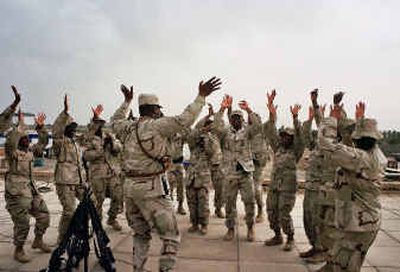Musical bond

The Wednesday night special “VH1 News Presents: Soundtrack To War” combines the use of music by America’s soldiers and the unsettling pictures of war.
A group of soldiers stands on a rooftop, singing gospel music. Suddenly, bombs explode. Nearby, black smoke rises.
A tank crew cranks up a heavy metal song to gear up for combat.
Using personal testimonies, the one-hour documentary examines the soldiers’ use of music for inspiration, motivation and mourning. The result: a unique look at youth in war.
“Soundtrack To War,” airing at 9 p.m. Wednesday (cable channel 62 in Spokane, 42 in Coeur d’Alene), follows soldiers of the Army’s 1st Armored Division during their 15-month deployment in Iraq from April 2003 to July 2004 — one of the military’s longest deployments since Vietnam.
“They couldn’t do it without their music. They couldn’t get through it without it,” Australian filmmaker George Gittoes says.
Gittoes relies on the soldiers to tell their own story as songs — including some written by them — push the documentary along.
The approach is effective, giving viewers a sense of who these soldiers are and what they face.
Several scenes also were featured in Michael Moore’s “Fahrenheit 9/11.” But unlike Moore’s film, “Soundtrack To War” centers on the soldiers’ personal feelings rather than their political ones.
While soldiers are typically cautious with their comments, they open up to Gittoes about music. And as they do, they talk about their war experiences.
The documentary begins with soldiers confiding how various songs — from Drowning Pool’s “Let the Bodies Hit the Floor” to Mystikal’s “Round Out the Tank” — help psyche them up before battle.
One soldier explains why Drowning Pool’s song was the motto for his tank crew during battles. Another tells how rapper Tupac Shakur’s songs were funneled through headsets in a M-1 Abrams tank as it rolled from Kuwait into Iraq at the start of the war, with the tunes changing to the Triple 6 Mafia when they hit the streets of Baghdad.
In one scene, a soldier talks about his affinity for punk rock and how few in his unit like the genre. He tells Gittoes how there was another soldier whom he bonded with over the music — one who was later killed by a roadside bomb.
In another scene, Pfc. Yona Hagos raps about being “like a biological weapon” and surviving enemy gunfire. In the credits, viewers learn he was later hit with a rocket-propelled grenade.
“The song is about trying to survive,” Hagos said. “I’m trying to get over it. It’s not something you just get over in a few days or a few months.”
In one of the film’s most memorable segments, a scene opens with soldiers on patrol in Baghdad when a car bomb explodes, killing a family in a car. In the back seat, a child’s toys are spattered with blood.
The scene moves to two soldiers — Spc. Joshua Revak and Sgt. Trenton Dull — sitting near a tank, strumming acoustic guitars. They explain how they became friends during the war and wrote a song together to honor fallen comrades.
“No other American sitting back in America can ever come close to understanding what a soldier goes through on the streets of Baghdad,” Revak says.
Later in the film, Gittoes returns to Revak.
“We’ve lost a lot of brothers. It gets tougher every day,” he says. “The only way I’ve been able to deal with that is to write music.”
Spc. Janel Daniels is yet another soldier who writes songs to cope.
“All you have is destruction around you. You have no idea what’s about to happen,” she said. “It’s so hard with everything going on. Music is vital out there.”
In the film’s final scenes, there’s a message of hope as three young soldiers — all from different ethnic backgrounds — rap about their experiences in Iraq.
“Music,” says Spc. Jaimeron Tippins, one of the trio, “has a lot to do with uniting us out here.”